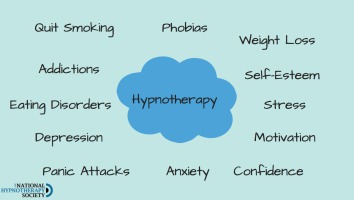
What Hypnotherapy Can do for You
Who can benefit from hypnotherapy?
Virtually everyone! We can
all experience hypnosis since we all day-dream and hypnosis is similar to a pleasant relaxed day-dream. Of course being individual personalities, each of us will experience it slightly
differently.
But when hypnotised you don't go to sleep, your hearing is perfectly normal, your memory is often enhanced and also you can talk quite normally. In fact, it is a pleasant experience in which you are
helped - not controlled. The hypnotherapist does not control you at any time. In hypnosis you don't pass out or go to sleep. You will hear the therapist's soothing and positive words.
After hypnotherapy, people often say they have 'never felt so relaxed'. Hypnosis is such a natural state of
mind that some people are even not aware when they are in a trance.
Realising the full benefits can't necessarily be achieved as a 'quick-fix', even though hypnotherapy often needs fewer sessions than other talking therapies, such as counselling, psychotherapy or
cognitive behaviour therapy (CBT). Sometimes it can be a 'quick-fix', but more often it is better to give it time to fully realise it's potential.
The range of issues that hypnotherapy can help with is very extensive, in fact, any issue where the mind is involved. Here
are just some:
Weight loss
Food disorders
Smoking cessation
Stress and anxiety
Self-esteem and confidence
Addictions
Phobias
What is hypnosis?
Hypnosis is a natural and highly receptive therapeutic learning
state. It is often described as an altered state of consciousness, where the unconscious and conscious parts of your mind can work on the same concept at the same time without conflict. It is a
powerful state of inner focus, concentration, and enhanced self-awareness.
How does hypnotherapy work?
Post-hypnotic suggestions and other approaches - such
as regression and Neuro-Linguistic Programming
(NLP) - are used to change negative feelings, habits and patterns of behaviour.
Hypnotherapy enhances the effectiveness of what is said, by communicating with the unconscious mind. Selective thinking is made more effective.
Is it like stage hypnosis?
No. In stage hypnosis there is no therapy or benefit to
the recipient, it is designed purely as entertainment.
Can you be hypnotised to say or do something against your will?
You are free to accept or reject suggestions made to
you in hypnosis and what you say (if anything) is entirely under your control.
Hypnotherapy is always used in a respectful and understanding way. Your therapy will be discussed with you in advance to ensure that you are comfortable with the approach.
Can you lose control or become 'stuck' in hypnosis?
No. Hypnosis involves focused attention and you remain
physically and mentally in control. Certainly, you won't become stuck in hypnosis and can start or finish as you choose, just as you can start or finish a daydream, or become engrossed in a book or
film. You can drive a motor vehicle immediately after hypnosis.
Hypnotherapy is about the unconscious mind, therefore it is best to let your directed thoughts (conscious mind) rest and not be analytical. For example, avoid thinking 'am I hypnotised' or
trying to relax. Don't try, just let it happen is best. Leaving your analytical mind to enjoy a rest is
best.
Can anyone be hypnotised?
Yes indeed. Everyone (unless they have a serious mental
health condition) can experience hypnosis, it is a totally natural state of mind rather like daydreaming. Everyone
daydreams! - Of course, like everything in life, there is a range of responses - from a deep state to a lighter trance. Hypnotherapy can, however, be just as effective for someone who is at the
lighter end of the range and at times a very deep state can be counterproductive. The main requirement is simply being receptive, to allow beneficial change to naturally occur.
How many sessions will I need?
This will very much depend on the extent of the problem
you want to address and the extent of your desired outcome. Everyone is different. Therapy is tailored to meet individual needs and objectives. It is a facilitator of self-development, to aid in
developing potential. For most issues, a programme of two to five sessions is typically recommended. Further sessions if needed will depend on how these sessions progress.
However, some long-standing issues can require 8 - 12 sessions (normally one a week), but even this is considerably less than is usual in counselling and psychotherapy which sometimes can even go on
for years! Generally, hypnotherapy is regarded as a brief therapy - but it still needs time to 'weave its magic'.
© Hypnotherapy Directory – Alan Gray

